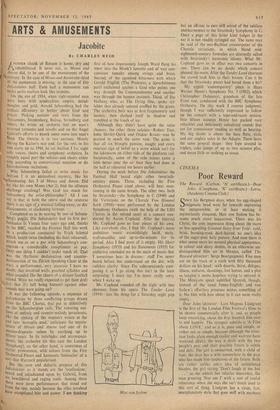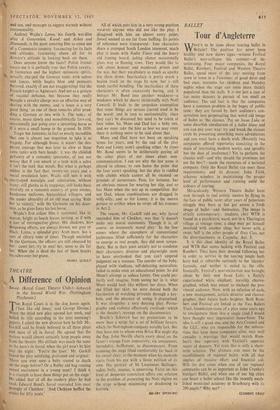CINEMA
Poor Reward
The Reward. (Carlton, 'A' certificate.)—Dear John. (Cinephone, 'X' certificate.)—Loina. (Academy Cinema Club.) C INCE his Bergman days, when his egg-shaped aenigmatic head went far towards expressing the inexpressible, or at least making it mysteriously eloquent, Max von Sydow has be- come much more loquacious. There was his Christ, the only impressive thing about the more or less appalling Greatest Story Ever Told: cold, brisk, burning-eyed, dark-haired, no one's idea of the sugar-pink holy picture. And now there is what seems more his normal physical appearance, in colour and dusty denim, in an otherwise un- distinguished film set in Mexico, called The Reward (director: Serge Bourguignon). Five men are on the track of a sixth with fifty thousand dollars on his head: with deserts, thirst, deluges, illness, vultures, shootings, lost horses, and a plot so tangled it seems hopeless trying to unravel it. The Mexicans speak subtitled Spanish, though, instead of the usual funny-English; and von Sydow's effortless presence makes something of it. No film with him about in it can seem really empty.
Dear John (director: Lars Magnus Lindgren) is the first of the London Film Festival's films to be shown commercially after it, and, as people keep remarking, about the first Swedish film ever to end happily. The synopsis subtitle is 'A Film about LOVE,' and so it is, pure and simple, or rather not so simple, because although the situa- tion looks plain enough (sailor and waitress have weekend affair), the way it deals with the two people's past and their possible future is subtle and deft. The girl is unmarried, with a child of four, the man has a. wife somewhere in the past who has made him suspicious of the future. Both are rather unlike one's idea of uninhibited Swedes. the girl saying 'Don't laugh at me but . . . ' as she admits her relative innocence, the man grunting 'Nor am I' with a sort of rueful reluctance when she says she isn't much used to this sort of thing. Lindgren has a clean, fast, unexplanatory style that goes well with seashore
and sun, and manages to suggest warmth without sentimentality.
Andrzej Wajda's Lotna, his fourth war-film after A Generation, Kam'', and Ashes and Diamonds, is the most amazing film to come out of a Communist country; fascinating for its facts and attitudes, fascinating above all for its director's attitude in looking back on them.
Does anyone know the facts? Polish friends assure me it is perfectly true that Polish cavalry, in formation and the highest optimistic spirits, actually charged the German tanks with sabres and lances, while bugles blew and pennants fluttered, exactly (I am not exaggerating) like the French knights at Agincourt. And not as a gesture of suicidal defiance, but because they really thought a cavalry charge was an effective way of dealing with the enemy, and 'a lance is a. very good thing,' as one of them remarks after prod- ding a German or two with it. The tanks. of course, move slowly and monolithically forward, Occasionally just going over a sprawling horse as if it were a small hump in the ground. In 1939.
Tragic but fantastic; in fact so nearly incredible that one is almost too impatient to take it as tragedy. For although brave. it wasn't the des- perate courage that was later to claw at those same tanks with bare hands: it was the childish gallantry of a romantic ignorance, of just not seeing that if you smack at a tank with a sabre It isn't the tank that minds. But what is perhaps oddest is the fact that, twenty-six years and a social revolution later, Wajda still sees it with starry-eyed nostalgia and admiration, without irony; still glories in its trappings, still looks back Wistfully on a romantic country of great estates, handsome uniforms, hierarchical villagers, and the tender absurdity of an old man saying 'Ride her to victory,' with the Germans on his door- step, as he gives Away his last horse.
Wajda's first colour film i5 autumnal, like its season, bright as beech leaves turning, as if with a sort of retrospective glitter. His shadows, his., deepening effects, are always brown, not grey or black. Lotna, a splendid grey Arab mare, has a sort of silvery tone at times. Though encircled by the Germans, the officers are still obsessed by her: covet her, try to steal her, seem to die for her. When she is dead the last of them breaks his sabre over her grave.
ISABEL QUIGLY















































 Previous page
Previous page